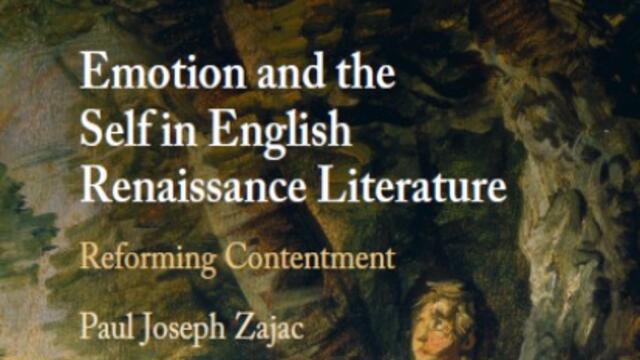In new book, McDaniel professor explores the meaning of contentment
“I’m trying to bring into the light and salvage the earlier meanings, after what scholars, theorists, and psychoanalysts have thought about contentment in the last hundred years,” says Paul Zajac, associate professor of English, about his new book “Emotion and the Self in English Renaissance Literature: Reforming Contentment.”


Associate Professor of English Paul Zajac recently published the “first full-length study of contentedness” in his first book, “Emotion and the Self in English Renaissance Literature: Reforming Contentment” from University of Cambridge Press.
“Reforming Contentment” uncovers the idea of contentment as an empowering emotion in Renaissance England. For readers today, that definition may be hard to believe, but authors like Philip Sidney, Edmund Spenser, William Shakespeare, and John Milton offer glimpses into the lost meaning.
- What inspired you to write this book?
- This project dates all the way back to my dissertation, but the first piece of the book to go out into the world was an article on the politics of contentment in Shakespeare’s “As You Like It.”
- There’s a passage in that play where the female protagonist and her friend are being banished from court. It’s a terrible tragedy, but they reinvent their circumstances as a positive for themselves in the line “Now go we in content to liberty, and not to banishment.”
- When I began looking into what scholars said about that passage and contentment, it was overwhelmingly negative. Scholars were assuming that contentment had to mean resignation, passivity, and giving up.
- My research showed that idea existed, but it existed alongside an idea of contentment as something that could be empowering. Contentment could allow the individual to take ownership of their own emotional wellbeing and shore up their sense of self in order to improve their circumstances or fight for what they believed in.
- What made the positive interpretation of contentment so compelling to you?
- Sometimes we think of emotions as being universal human experiences. There’s some truth to that, but I think scholars have increasingly learned to get into the contexts of how people expressed, experienced, and represented their emotions in different time periods. So much of the research that has been done in my field for the last 25 years has been focused on negative emotions.
- Scholars often associate Renaissance Protestantism with the religious emotion of despair. This well-known, obviously negative emotion has historically overshadowed what was also a revolution in people’s thinking about positive emotions. That fact really energized my research and motivated the scholarship that went into this book.
- Where did the term contentment come from, and what influenced its meaning during the Reformation?
- The term has roots in the Latin words continere, to hold together or contain, and contentus, meaning contained, restrained, and satisfied. The conjoint evolution of those words, and how they were used in English, lends itself to contentment being a positive emotion that allows one to hold themselves together, especially in times of difficulty or crisis.
- The positive version of contentment was undergoing change in the 1500s and 1600s. In England, the thinking around religion became less hierarchical and more individual, which lends itself to how being content can mean reinventing your outlook for personal betterment.
- What does “Reforming Contentment” contribute to the existing body of research about emotion?
- It corrects anachronistic understandings of “Look how far we’ve come.” We’ve certainly come a long way, but we’ve also lost a lot along the way. It also explores how a particular model of contentment that has disappeared from the current landscape could be worth bringing back.
- The other thing that I hope my book helps contribute to — though it’s certainly not alone in this — is showing the significance of literary forms. For example, in my Shakespeare chapter, I take very seriously that one work is a comedy, and one work is a tragedy.
- Genre gives each author a range of tools, opportunities, and constraints when they are representing contentment. It’s important to me that scholars don’t just treat texts like oranges that we squeeze to get the juice out of, but that we understand them in their context as aesthetic objects with their own textual histories.
- How do you study emotion through literature?
- I study both the emotions that the texts are trying to elicit from readers and the ones that the characters are experiencing in the texts. I’m comfortable when conversations in the classroom steer toward how the texts are making us feel, because that’s such a huge dimension of why they were written and why they’ve continued to exist. But it’s also important to understand that contentment is a word that people in the historical moment took seriously and had rigorous theorization and conversations about. So, Shakespeare or Spenser know what they’re talking about, but it may differ from our own understandings. Authors also come to very different conclusions than each other within the Reformation framework of contentment, and the only way to appreciate those nuances is to learn more about the term itself.
- How does contentment in the 16th century connect to our understanding of it today?
- The early modern meaning can seem counterintuitive for us today. Why would someone who’s content worry about changing anything? But early modern individuals saw it as completely consistent to do that work with the self, then use that as a stepping stone to accomplish other things.
- I think part of the reason contentment feels out of place in contemporary culture — and the reason I would argue for its importance and relevance — is that we live in an emotionally radicalized moment. You only have to spend five minutes on social media to see that people have a lot of strong feelings that are often negative expressions, which are justified. But what I think was realized and articulated in the Renaissance is that the existence of negative emotions doesn’t have to come at the cost of positive emotions. What is important about contentment is that it can help the individual survive even when they’re being buffeted by all of the negative emotions.
- For modern scholars, there’s also this default assumption that sad things are more impactful and deserving of aesthetic appreciation, and happy things are superficial. There are classical roots of this in Aristotle, who places the genre of tragedy above comedy, an ancient privileging of sad over happy. Freud also influenced our modern thinking. He defines contentment as a consolation that happens when you have to repress or deny your instincts and desires. Even the title of his major work translates to “Civilization and Its Discontents.” Later psychoanalysts really run with this idea.
- So, I’m trying to bring into the light and salvage the earlier meanings, after what scholars, theorists, and psychoanalysts have thought about contentment in the last hundred years.